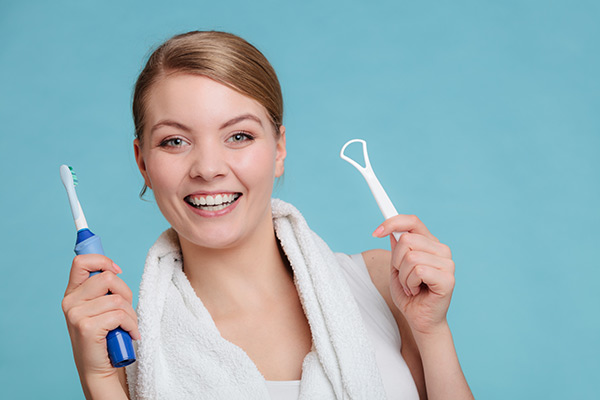Do you brush and floss every day? Even if you think you have a flawless dental care routine, you may be missing an important step: cleaning your tongue. Bacteria in your mouth doesn’t only affect your teeth and gums. The same bacteria can be found on your tongue – top and bottom. To have a clean tongue, you need to take steps to remove these bacteria just as you would with your teeth.
How to Clean Your Tongue

#1. Toothbrush
One of the most common ways to clean your tongue is simply using your toothbrush. You can use the same one you use to brush your teeth. It’s as simple as you might imagine: simply brush the surfaces of your tongue.
You’ll want to brush forward-and-back, and side-to-side. This helps make sure the bristles get in every groove possible. Be careful not to brush too hard or too long! The bristles of your brush are abrasive, and could break the skin.
When you’re finished, rinse your mouth with water.
#2. Tongue Scraper
Another option is the tongue scraper, sometimes called a tongue cleaner or tongue brush. These tools are exclusively designed to help you clean your tongue. However, most evidence shows that they don’t offer any real benefit over simply using your toothbrush.
When using a tongue scraper, try to stick your tongue out as far as possible. Use a little pressure to push the scraper against your tongue and pull it forward. Don’t go too far back or you may trigger your gag reflex. Rinse the scraper after each pull and keep cleaning until it stops pulling up any film or residue.
Like a toothbrush, there is a risk if you’re too overzealous when cleaning. Excessive tongue scraping can damage your taste buds – so only use as much pressure as you need to slightly flatten your tongue with each scrape.
If you get used to using tongue scrapers, remember to buy one to keep in your orthodontic travel kit, too! Keeping your tongue healthy while you travel is just as important as keeping it clean while you’re at home.
Why You Need to Clean Your Tongue
While your tongue won’t develop cavities, it can develop infections and odors due to accumulating bacteria. Your tongue’s surface may feel smooth, but it has small crevices all over. This gives bacteria many places to hide.
If you forego cleaning your tongue, these bacteria will thrive just as it would on your teeth without brushing. Over time, you may develop significant halitosis. Some research shows that most cases of bad breath can be lessened, if not remedied entirely, from cleaning your tongue.
Like cleaning a retainer, rinsing isn’t enough to clean your tongue. The bacteria don’t just build – they collect in groups called biofilm. This film not only keeps bacteria attached to your tongue, it actually protects more bacteria underneath. So, even if you use mouth rinses, you will only kill the bacteria on the top level of the film.
Illnesses That Affect the Tongue
Did you know you can experience an illness that affects your tongue? Here are some of the most common:
Thrush – A yeast infection caused by fungus. Thrush sometimes causes a burning sensation and is most common in babies or adults with weakened immune systems.
Leukoplakia – A somewhat common condition that leaves a white patch on the tongue. This is caused by an overgrowth of cells in the mouth and deposits of a protein called keratin. Leukoplakia can sometimes be a precursor to cancer.
Oral Lichen Planus – This immune system disorder causes white streaks or patches on your tongue. It can lead to burning pains, but many cases don’t cause any noticeable discomfort.
Canker Sores – Though benign, canker sores can be quite painful. Read our tips on treating canker sores to help them heal faster.
Do Piercings Put Your Tongue at Risk?
Yes! While a tongue piercing may be fashionable to some, it requires inflicting harm to your tongue. Like any piercing, the healing period is important and you need to take every step possible to reduce your chances of infection.
When your tongue has healed, and you can safely remove the piercing, make sure to remove it and clean it just as you do with your teeth and gums. The piercing is another surface that can collect and hide bacteria – increasing your risk of infections, bad breath and illness.
Your Tongue Color Can Tell You About Its Health!
One fun fact is that your tongue can give you some visual clues as to its health!
Bright Red Tongue
If you have a bright red tongue, you may have a vitamin deficiency! When your body is lacking B12 or iron, your tongue will lose papillae that use those vitamins to mature. When they’re gone, your tongue will take on a smooth, glossy red appearance. This often happens with vegetarians who need iron supplements due not eating iron-rich meat.
A tongue that resembles a strawberry, red and bumpy, may indicate scarlet fever or Kawasaki disease. Both are serious illnesses that should be examined by a medical professional as soon as possible.
Fuzzy Brown or Black Tongue
This symptom could be an indicator that you need to improve your oral hygiene. Overgrown papillae, typically worn down by eating and drinking, can become discolored and noticeable. For most people, this is a side-effect caused by smoking, drinking dark liquids like coffee or inadequate hygiene.
If you have diabetes, are undergoing chemotherapy, or are taking antibiotics, you may be more likely to develop this condition. The only major risk – besides bad breath – is that the papillae can hold more bacteria that needs to be cleaned away.
Blue Tongue
Not to be taken lightly, a blue tongue is a sign of a serious medical emergency. Typically, your tongue turning blue indicates a lack of oxygen to the tissue, also known as cyanosis. The cause of cyanosis can be anything from a blood disorder to respiratory insufficiencies.
A Healthy Human Tongue Should Be Pink-Red
Because your tongue can be a helpful indicator of your health, it’s important to keep it clean. In addition to directly impacting your health, a bacteria-laden tongue can disguise underlying symptoms. After you clean your tongue, inspect it to make sure it has the natural pinkish-reddish hue. If you discover discoloration, it may be time to schedule a visit with your primary physician.
Schedule a Free Consultation
Do you have questions about your dental health? We’ve got answers! Contact us online or call 440-842-8015 to schedule a free consultation!
Stay connected with Doctor Andy on Social Media!
Facebook | Twitter | Google+





